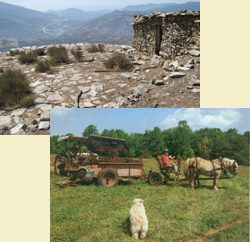« Introduction to Systems Thinking | Home | Economics as brain damage »
A sustainable agriculture research and education agenda to address a gathering crisis
By Karl North | January 31, 2010
A Sustainable Agriculture Research & Education Agenda to Address a Gathering Crisis
Karl North 2002
The Crisis, in its multidimensionality, with likely multiplier effects across its elements:
- Exponentially rising energy costs for coming decades as currently foreseeable alternative energy technologies fail to compensate for the end of cheap oil;
- Gradual loss of most of the energy-intensive inputs that currently prop agricultural productivity and mask the degraded state of most farmland. Present low agroecosystemic potential stems from decades of damage to its natural capital: the biodiversity and health of mineral, water and carbon cycles that provide essential ecological services.
- Increasing water shortage for the irrigated deserts that currently supply large proportions of the food economy;
- Accumulation of persistent organic pollutants, degradation of genetic traits of sustainability in most agricultural plants and animals, homogenization of gene pools and extinction losses, all of which undermine capacity to build a sustainable agriculture at a pace the situation calls for;
- Increasing weather volatility, a near term impact of climate change;
- Increasing agroecosystem instability, a long term impact of climate change;
- Increasing economic crisis in the United States as federal debt, consumer debt, and trade deficit approach a tipping point;
- A declining domestic economy as the empire tries to salvage with military control what it is gradually losing in global economic hegemony.
The Agenda
To address the crisis, a research and education agenda must first free itself from two current limitations:
- The disciplinary straight-jacket that still severely controls the shape of programs.
- The confinement to outcomes that are viable in the present economic system. This puts the most important steps toward sustainability off the agenda. Much of what is acceptable within the limits of economic viability is band-aid science, which addresses symptoms and secondary effects of bad system design when looming necessity requires a frontal attack on root causes of unsustainability. This tinkering around the edges with existing systems rather than thinking either creatively or holistically about the issue needs to give way to whole system redesign that addresses the severe sustainability issues that will appear with the end of cheap oil.
The guiding principles of research and education programs must include:
- A scientific perspective based on the understanding that sustainability pertains only to systems, not isolated practices. Hence evaluation of a practice becomes a function of its ability to enhance sustainability in a specified systemic context.
- A comprehensive systems methodology, using the tools of modeling and simulation of complex system designs and scenarios that modern computer power affords. These tools permit long term simulation of the complex dynamics that system feedback structures generate, when actual long-term experimentation is too costly.
- Agroecology as its scientific basis and the core of the training program, not current departmental traditions, narrow in perspective and corrupted by a devotion to production agriculture designs that mainly serve a capitalist financial class.
- Methods of whole system evaluation of progress of the model toward sustainability, methods that reveal the interdependence of progress in the various indicators of sustainability. Examples are in use in Latin America. See my paper Monitoring Farms for Progress toward Sustainability for an introduction to one of these.
- An approach that gradually aims toward zero external input, zero emissions designs, to replace a high input agriculture that will suffer permanent decline with the end of the cheap energy economy.
- An approach that models a much higher farm self-sufficiency in the production of energy, fertility, seed, pest control and other major inputs than is currently economically viable on any commercial farm.
- Full utilization of regional biodiversity potential including multi-species animal and microbiological integration, and intensely polycultural cropping designs including wild and edge effect habitats.
- An invitation to greater farmer/consumer collaboration in model and project design and execution than any current effort.
Topics: Agriculture, Northland Sheep Dairy, Recent Additions, Social Futures, Peak Oil, Relocalization, Systems Thinking Tools | No Comments »
